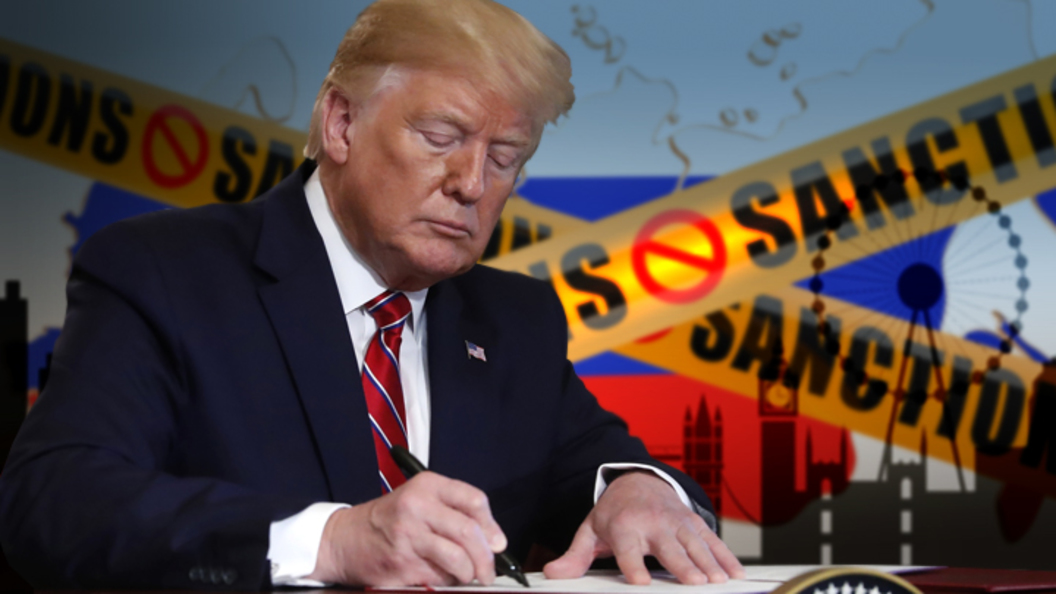
The threat to the Russian economy from Trump`s ultimatum still persists.

An Element of Pressure
Question: Donald Trump`s ultimatum, threatening new duties and secondary sanctions against Russia, expired on August 8th. However, no concrete decisions have followed, likely in anticipation of the upcoming meeting between the two leaders on August 15th. To what extent are the threats of overseas duties serious, has Russia`s economy adapted to external influences, and are there ways to mitigate the consequences of new restrictions? «MK» asked experts for their insights, including Alexander Razuvaev (Guild of Financial Analysts and Risk Managers), Alexey Vedev (Doctor of Economic Sciences), and Nikita Maslennikov (Center for Political Technologies).
Nikita Maslennikov: «I believe this is primarily a tactical pressure. Trump largely achieved his goal of arranging direct negotiations through his special envoy`s visit, but the threat of sanctions remains. Immediate harsh measures were impractical due to upcoming trade talks with China (August 12) and India (August 25). Imposing 100% tariffs on China would undermine the current fragile truce, and with India, 20% tariffs are already in effect with a delayed increase. For Russia, the sanction postponement is a call for caution. Our economy has adapted, avoiding collapse, but sanctions have exacerbated chronic issues like low investment in fixed capital and technological lagging.»
Alexander Razuvaev: «Our economic relations with the US are more about investments than foreign trade. Trade volumes have always been modest, with Europe, Asia, and the Middle East being our primary partners. Investments, however, have historically been significant; decades ago, a large share of Russian stocks belonged to Western funds. While this dependence has decreased, access to foreign capital remains crucial. I anticipate that both sides will seek a compromise, possibly even a framework agreement this year, which could boost the stock market and consumer confidence, and help avoid sharp currency fluctuations. The US insistence on dollar-based export settlements is a contentious point, but likely negotiable.»
Alexey Vedev: «In my view, this is indeed more an element of pressure. Direct sanctions are not very painful due to our limited trade with the US. Secondary restrictions, particularly on financial transactions, are far more sensitive. We`ve restructured export and import logistics, but settlements are more complex. However, the main drag on the economy right now isn`t sanctions, but our own rigid monetary policy. Its effect on GDP growth may be stronger than that of external pressure.»
Direct Indicator of Problems
Question: American sanctions could affect not only Russia but also its key trading partners like India and China. How vulnerable is Russian foreign trade if US secondary sanctions come into force? What will happen to exports and foreign exchange earnings? How will trade flows change?
Nikita Maslennikov: «The trend is clear. Over the first seven months of this year, we’ve seen imports decline by over 6%, while exports grew by only 1%. The budget deficit for this period rose from 1.7% to 2.2% of GDP. Oil and gas revenues from January to July totaled approximately 5.25 trillion rubles, an 18% decrease year-on-year, with July seeing a 27% drop compared to the same month last year. Discounts on Russian oil have remained within a certain range, but risks persist. In recent months, seaborne oil deliveries to China decreased by about 5%, while shipments to India slightly increased. China receives a significant portion of its oil via pipelines, making maritime restrictions less critical for them. India faces higher risks, but their positions are varied: some refineries pause purchases, while others continue, and tankers keep moving. If the US were to impose 100% tariffs, it would also hurt their own economy, so immediate implementation seems unlikely. In the event of sharp restrictions with China, we could accelerate negotiations on new pipeline routes. With India, it`s more complex; they might leverage concessions on other fronts, including reduced tariffs on high-tech products. I rate the risk of a sharp collapse in oil exports as low, but a steady reduction in foreign trade flows is already underway. Recent Central Bank data shows that in June, the aggregate financial flow from export sectors was near zero, and in July, it fell by 8%, and in some sectors, by 9–10%. This is a direct indicator of problems.»
Question: If 100% tariffs are introduced by America, which sectors of our economy will suffer the most—energy, agriculture, military-industrial complex, machine building? Will China and India be able to circumvent «secondary» sanctions, and how will this affect demand for our goods?
Alexander Razuvaev: «Some export data is currently classified. Russia previously ranked second globally in certain supplies, but the situation has changed. We often don`t publicize contracts, but India, China, and African countries have been traditional buyers of our products. A strong ruble reduces the profitability of exports, affecting all sectors. In the gas sector, `TurkStream` remains the main route to Europe, and China is a major consumer. There`s a hypothesis that the US could resell our gas to Europe by acquiring infrastructure, but this is merely speculation for now. We also actively supply food and processed products—from sweets to ice cream—to China. However, China is a tough negotiator on prices and prefers to diversify suppliers. Dependence on a single large buyer is always risky.»
Nikita Maslennikov: «Over the first seven months of this year, trade with China decreased by 8–10%. This is linked to China`s reorientation of exports towards Southeast Asian markets and the weakening of the yuan. We face challenges not only in oil and gas but also in grain exports: a slight reduction in deliveries is expected in the new agricultural year (July 2025 – July 2026). The losses won`t be critical, but we might miss out on several billion dollars. One of our current tasks is to expand agricultural exports in line with global trends. Oilseeds and processed products, including seafood and fish products, are in demand. Developing processing and value-added deliveries would have a significant impact.»
Alexey Vedev: «Foreign trade is currently almost independent of the ruble exchange rate. A strong national currency reduces exporters` ruble revenues, but supply volumes remain stable. Industrial assembly, which began in the late 2000s, has virtually ceased, which is a notable drawback. Imports from China depend on domestic demand, so a 5–8% decline in certain areas, such as automobiles, is quite expected. For exports, we will likely maintain last year`s levels in both physical volumes and foreign exchange earnings. A positive foreign trade balance will persist. The ruble will probably be slightly weakened within the framework of the budget rule, but this will primarily be for budget replenishment, not export support. I don`t anticipate sharp changes.»
A Two-Tier Economy
Question: If the measures announced by Trump are implemented, how will they affect Russian consumers? Can we expect price increases and inflation? What might be the ruble`s behavior until the end of summer? Is there a basis for a new round of its weakening?
Alexey Vedev: «In our economy, it`s hard to separate the impact of sanctions from the consequences of internal monetary policy. Over the last four months, fundamental changes have occurred: wage growth has stopped, labor demand has decreased, and companies are cutting costs. We are effectively returning to a cautious consumption model, similar to three years ago. This is already evident in forecasts: instead of last year`s 4.3% GDP growth, this year`s is expected to be around 1.2–1.5%. Real disposable incomes will grow slower, and demand will decrease. This isn`t a recession yet, but it`s a noticeable slowdown. Domestic interest rates remain high: long-term bonds are yielding double-digit percentages, making saving more attractive than investing. This immediately impacts construction (permits for new projects have fallen by approximately 30%), which means future demand for metal and other materials will decrease. I never believed our economy was `overheated.` The problem lies elsewhere—in an underestimated potential for GDP growth. Services, which account for almost half of the economy, show high productivity, especially with digitalization. But now we`ve ourselves slowed this process, resulting in a fall in demand and slower growth rates.»
Nikita Maslennikov: «I agree that the main problem lies in the chronic weaknesses of our economy. Today, we need to decide what is more important for us: accelerated growth or financial stability with low inflation. Experience shows that imbalance quickly pushes the budget and economy into a crisis zone. Annual inflation stands at 8.77%. To approach the target, it needs to be held closer to 5%. However, the budget deficit already exceeds the initially planned level, and it`s not certain that it will decrease by year-end. This poses a serious inflationary risk. If the deficit reaches 3% of GDP, the Central Bank might either maintain a high key rate for a prolonged period or even raise it. If a new round of sanctions does follow, it will affect oil and gas revenues and could nullify net export`s contribution to growth. However, if escalation can be avoided and at least a truce maintained until the end of the year, we will have a chance for a gradual reduction in rates and business stimulation. Growth next year will likely be higher, but everything depends on structural economic reforms, investments, and labor productivity. Sanctions are unpleasant because they precisely target our vulnerable points, precisely since late last year. The answer must be coordinated interaction among regulators, new measures to support investments, and accelerated technology adoption. The moment of truth will be the budget projections for 2028 and the Central Bank`s reaction in the last quarter of this year.»
Question: Russian authorities declare their «immunity» to sanctions and that the economy has long been operating under severe restrictions. Are there mechanisms in the Russian economy that can mitigate the impact of new tariff restrictions?
Nikita Maslennikov: «Significant macroeconomic effects from new sanctions are unlikely. It`s crucial for us to maintain financial balance and price stability through coordinated efforts of the government, the Central Bank, and support for private investments. We are already in a phase of economic growth slowdown, but to stably fulfill defense and social obligations, we need growth rates of around 3% per year. If we lag behind the global economy, risks will increase. Even if there`s a peaceful respite, the pressure and demands of sanctions will remain—for example, regarding the conversion of the defense industry and employment for those returning from the front. This is a significant challenge for future growth and is not directly related to sanctions.»
Alexander Razuvaev: «Cybersecurity is a very acute issue. A recent attack on major Russian air carriers demonstrates infrastructure vulnerability. Many Western companies are leaving the market but wish to return. Cyber threats can affect critical infrastructures—air travel, railways, and so on. Russian companies are forced to cut costs, but without proper cyber protection, this is risky. The issue requires significant attention and resources, otherwise, the consequences could be severe.»
Alexey Vedev: «I partly agree with the idea of `immunity` to sanctions. I support the concept of a two-tier economy—resource-based and high-tech. It`s crucial that the resource-based safety cushion is secured by long-term contracts, and the high-tech sector develops freely. This requires normalizing financial operations—so money can flow freely, assets are not frozen, and work can be done with various currencies. Of course, we have adapted to sanctions, but for example, the domestic automotive industry has become more nationalized, which negatively affects the quality and price of cars. Optimization has occurred, but it would be better to remove sanction pressure for further development.»











